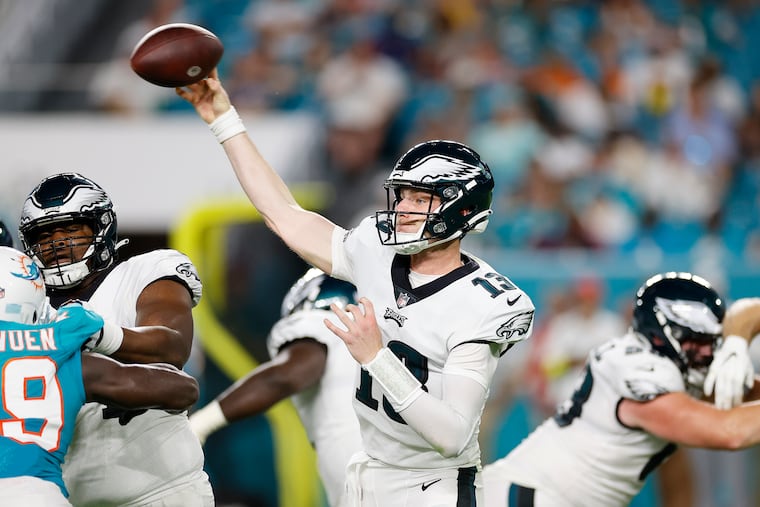That ugly Eagles-Dolphins game showed that the NFL preseason is becoming pointless
Everything about the league is getting bigger ... except the preseason, which is getting shorter and losing relevance. So why bother playing the games at all?

Little about the NFL has gotten smaller over the years. As insatiable consumers of football, we know and accept and even celebrate this. The players are taller, heavier, faster, stronger. The revenues have soared into the billions. The regular season is longer. The postseason now features 14 teams, seven from each conference. The draft takes three days to complete and is a source of speculation and fascination for the year’s remaining 362 turns of the earth.
It used to be that pro football owned Sunday afternoons and Monday nights. Now it owns Sunday afternoons, Sunday nights, Monday nights, Thursday nights, and a few Saturdays — and that’s just from early September through early February, when they play the games that count. Bigger, bigger, bigger. More, more, more.
» READ MORE: ‘No comment’: Eagles describe — and decline to discuss — life on the roster bubble ahead of NFL cut day
That trend is true, and seemingly irreversible, everywhere except in one aspect of the league: the preseason. The length of the NFL regular season has been stretching for more than 70 years. In 1961, it went from 12 games to 14. In 1978, it went from 14 to 16. Last year, it went from 16 to 17. And, in turn, the length of the preseason has been shrinking: six games from 1970 to 1977, four games from 1978 to 2019, three games now. And after what transpired at Hard Rock Stadium in Miami Gardens on Saturday night, the league would probably bag the whole idea of preseason games by next summer if it could.
It wasn’t just that the Dolphins demolished the Eagles, 48-10, in a thoroughly stultifying exercise of football. One-sided games happen, whether in late August or on the first Sunday in February. It was that the two teams entered the game at cross-purposes. Nick Sirianni kept all his starters on the bench. The Eagles are deep and expected to contend for a division title at a minimum, so Sirianni approached Saturday’s game with two goals: 1) Make sure the team’s best and most important players remain healthy (with the exception of backup quarterback Gardner Minshew, because somebody other than Reid Sinnett and Carson Strong had to take some of those snaps, if only for aesthetic reasons); and 2) Evaluate those players who will make up the bottom part of the roster.
Mike McDaniel, the Dolphins’ first-year head coach, is in a different situation. Miami hasn’t qualified for the playoffs since 2016 and has done so just twice in the last 20 years. McDaniel is charged with turning around a moribund franchise. He was more inclined to play his starters anyway — set the tone, change the culture, all that — especially once the Dolphins missed a day of reps Thursday after a stomach bug ripped through their locker room. They had to cancel their joint practice with the Eagles.
Sirianni knew that McDaniel was going to play several of the Dolphins’ key players Saturday, including quarterback Tua Tagovailoa and star wide receiver Tyreek Hill. But McDaniel’s plan didn’t compel Sirianni to alter his. “I thought our guys got two good days of work in while we were here,” Sirianni told reporters after the game. “I thought they were ready for that week, and I didn’t want to overpush them after the amount of work that we did in those two days.” As it turned out, Tagovailoa and Hill connected for completions on the game’s first two plays — a 51-yarder and a 13-yarder — against the Eagles’ overmatched second- and third-teamers, and the rout ensued from there. One has to wonder whether Sirianni saw any value in playing the game.
“Just disappointed in the execution,” he said. “I just think we didn’t do a good enough job as coaches and players, but that doesn’t diminish the amount of good work we got in for the last month-plus in training camp.”
If that’s the case, if a dismal performance in a preseason finale has no bearing on a coach’s evaluation of his team’s overall progress, what are we doing here? Why play these games at all? The exercise becomes pointless, a matter of going through the motions just because This is the way it has always been done.
Except it probably won’t be done that way much longer. The NFL isn’t going to wait another 43 years to lengthen the regular season again. The league’s collective bargaining agreement expires in 2030, which means that each team’s schedule will be at least 18 games soon enough. In turn, the preseason will likely be cut to two games at most. And as more and more coaches, like Sirianni, prefer and rely on joint practices to gauge their teams’ improvement and get their players ready, more and more coaches will see even one or two preseason contests as a needless risk. Why place a quarterback or left tackle or wide receiver in an uncontrolled and uncontrollable environment until you absolutely have to? Why take the chance that he might suffer a serious or season-ending injury?
» READ MORE: What we learned from Eagles-Dolphins: Where Devon Allen and Reid Sinnett stand; chance for trades
More and more, the preseason seems simply a problem for the NFL to solve. Shame it couldn’t have solved it before people plopped down in front of their televisions Saturday night.